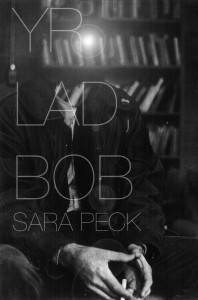Chronicles of the Immediate Present
 Yr Lad, Bob
Yr Lad, Bob
by Sara Peck
Persistent Editions, 2013
$8 Buy from Persistent Editions
The South Carolinian poet Sara Peck has opened, in part, her chapbook Yr Lad, Bob (Persistent Editions, 2013) with a set of phrases that reference two very different experiences of time:
waiting for the train // I’ll always love / you
Waiting, of course, tends to slow time down so much that one becomes aware, almost, of its not passing. And a variety of apprehensions can exacerbate this awareness even more: will the train ever come? Will I be on time when I get where I’m going? Will I be able to do whatever I’m going there for? The feelings waiting can trigger are then contrasted with the line’s next phrase, the promise of which, of always being loved, attempts to mollify all apprehension and impatience. That is, an awareness of how slow time can feel is opposed to a feeling or desire that love will trump time by not ending, which is implicit in the word “always.” Readers of Yr Lad, Bob will find out in the book’s Forward (by poet Lisa Fishman) that single and double slash marks in the text indentify line breaks and stanza divisions in original poems; Peck has culled lines and phrases for her own book from the works of Robert Creeley, Denise Levertov, and Robert Duncan and interspersed these with what were once her reading notes. Here though, as elsewhere throughout Yr lad, Bob, the slash marks serve an additional function: they create silent interruptions which, surprisingly, and unlike commas and other punctuation, do not require the reader to stop or pause; in fact if anything they force the reader on. As a result, the reader accesses moments, phenomena, and feelings which are almost mutually exclusive but which can occur in the poems in one and the same line, or, in terms of the poem read aloud, in one and the same breath. The slash marks allow for the co-existence of things that don’t normally go together, and encountering and experiencing this co-existence is one of the many pleasing things that happens to readers of the book.
Elsewhere in Yr Lad, Bob the slashes touch on time by graphically disrupting colloquial phrases (such as “over and over”) that express repetition if not continuity:
that freshness, over / and over: summer / in the folds of your dress
In examples like these, one begins to see that part of the relineation project of the text is to re-score, or set to new music, a selection of lines by Black Mountain poets. The slashes, however, take us further: look at how they separate the line above into the very tresses or folds on which the line itself ends. It is in moments and places like this that Sara Peck’s chapbook expands the reader’s awareness of time to include an acute awareness of the overall appearance of the page. And such an acute awareness goes far beyond an understanding of reading which views that process solely in terms of signification, that is, in terms of words having the function of conveying something (mental pictures, emotion, information) to a reader or receiver.
As the poems in Yr Lad, Bob gradually shift us from reading to looking, we become, in places, exposed to the raw exchange of sameness and difference which is evidently a core part of language. Even a phrase as simple as
weather / to reassure
is teeming with variation. The first syllable in “reassure” picks up and recycles, as in a mirror reversal, the final syllable in “weather.” The same vowel combination (“ea”) appears in both words, but each time differently, once as diphthong, once as separate syllables. Finally, both words end in “r”-sounds which are close but not exact matches; the sounds cleave toward each other as they fail to overlap perfectly.
February 3rd, 2014 / 10:00 am
A Room in the Living Ruin of the Lyric
 Hosni Mubarak
Hosni Mubarak
by Jared Joseph
Persistent Editions, June 2013
35 pages / $8 Buy from Persistent Editions
Hosni Mubarak is author Jared Joseph’s second chapbook of poetry, and Persistent Editions’ inaugural publication. Mubarak’s lyric-challenging poetic establishes Joseph and Persistent Editions as poet and press to be followed.
What strikes first about this collection is its cover: a photo of Mubarak from the shoulders up, his faced streaked in neon reds, yellows, and blues. We know straight off that we are in potentially provocative territory. When the critical reaction to Carolyn Forche’s The Colonel remains today as a reminder not to vacation in the suffering of others, it might seem that a book – written by an American – that takes the name of a deposed Egyptian president might be waiting for the same charges to be levied against it. Not so. What we have here is a different entity entirely.
Here, the emotional counterparts (see: apathy, detachment, disillusionment) to Western media-era remove from world events are not elided; instead they provide the bridges that Joseph uses to write into his encounters with “Mubarak”. Yet Joseph is able to do this without twisting the work to become pedantic – there is no claim to a better perspective, no call for empathy or action other than what might be suggested by its lack. Joseph moves in and out of autobiographical modes through the eyes of this imaginary Mubarak: these qualities are explored in Mubarak, and in the speaker inside Mubarak. This is not a convenient mirror in which to better see ourselves – this is the light across it, the shimmer of something just behind our shoulders, and the language is its play.
The voice of Joseph’s Mubarak is at once erudite and childlike: language not used exactly, but capably, as if itself exempt from a pressure to be dutiful – it phrases the world as it pleases. The speaker shifts fluidly, almost arrogantly, between lexicons: the scientist’s, the politician’s, a young man’s – shifting code and binding vocabularies together, and in the process enacting a wild sense of entitlement:
a tension reservoir of air, something requiring the first exhale-
ation, I don’t really understand natural laws. Anyways, just
one finger needed to fire empty the casing.
July 12th, 2013 / 11:00 am
